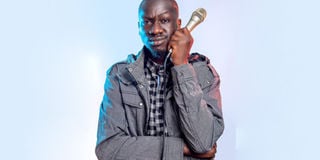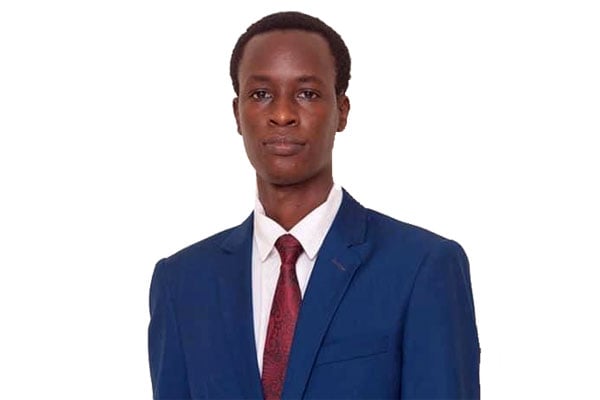Prime
Hillary Okello: Telling stories just for laughs

Okello says he is glad that many comedians are earning big from comedy, which is encouraging budding comedians. PHOTOs/ courtesy
What you need to know:
Hillary Okello is a medical doctor. He is also a comedian who will be staging his second comedy show, Funny on Purpose, this evening at Theatre Labonita.
Where did the comedy dream start from?
While in my O-Level at Jinja College, I was very fascinated by the comedians I saw on TV such as Salvado, Alex Muhangi, Emma Napoleon and we had these handful of students who were part of what they called the Current Affairs Club. Basically what they did was read news on Friday mornings at the general assembly. I always looked forward to Friday mornings just to watch them read the news because it was fun and entertaining. As a result, I attended one of their meetings and asked to join, which at first they were skeptical about but eventually gave me a shot. I was the one who wrote jokes about events of the past week. For example if a football game happened or there was a prom party, I would find jokes in that regard and perform them on Friday during assembly.
When I left Jinja College and joined Our Lady of Good Counsel, Gayaza for my A-Level, I introduced the same thing and got a positive reception. I also used to MC at most school events and I started to perform stand-up comedy at school seminars. What is interesting is that when I look back at my joke writing skills back then compared to where I am now, I feel like whatever I did was not even that funny, but for some reason people enjoyed them.
Clearly the dream was there. So did you get any training to polish your skills?
Yes. I participated in two comedy competitions, one in 2017 with Comedy Files called Next Top Comedian, which happened at Theatre Labonita. I remember the fee for auditioning was Shs20,000 and I had to borrow it from a friend at campus just so I could try my luck. I was able to make it to the top five.
I also took part in The Comic competitions created by Salvado in partnership with NBS TV. I remember the first day of signing up we were asked to perform before judges and make them laugh in one minute. That was scary, because I am a storyteller and most of my jokes last five minutes each. So trimming them down to a minute was challenging but it taught me a new skill in comedy, which is adaptability and time-keeping. Anyway, eventually we made it until the semifinals, where I was eliminated, but the exposure and experience I had is unmatched. I believe it is after that competition that Salvado and I became acquainted and started working together more. I have appeared on his stage multiple times, and even travelled to countries performing together with him, which for me is still a big reward.
Where are your strongest areas in comedy?
I would say storytelling. Many people have told me I know how to captivate the audience and take them on a journey while performing my jokes. I challenge myself to learn different ways I can improve on storytelling, I read a lot of books about stand-up comedy, watch a lot of comedy documentaries and listen to a lot of podcasts by comedians. Then I try to learn new skills, for example, right now I can do more than seven different international accents, which helps when I am on a stage in America, UK, India, China, France and others.
I also think I come off as charming and friendly on stage, which to some people makes the comedy easily acceptable. Sometimes on stage I even laugh at my own jokes because I enjoy them that much.
You are also a medic. In which area of medicine do you specialise?
I am a clinician. I have a diploma in clinical medicine and I plan to upgrade.
Has comedy ever interfered in your medical career?
I stopped working in the medical field for a year now because it was becoming quite hard to balance the two careers. Also at the time my comedy career was skyrocketing, so I just had to ride along and strike the iron while it is hot. But even then, I still plan on returning to medical practice, because it is something I actually like to do. But this time I want to be self-employed rather than work for a health facility.

Will that not affect your comedy?
If I can own a medical centre/clinic, it gives me autonomy and freedom on when to work based on my comedy show schedules, but as you know on the contrary when you have employers it is a bit hard, because you cannot keep missing work just because you have shows to perform at. Also sometimes I have shows in other countries and I have to fly out of Uganda for a couple of days, therefore if I am employed then it becomes quite a problem but in a situation where I am self-employed, I can easily get medical staff to cover for me in my absence.
If you were to choose between comedy and medicine, what would you drop?
Honestly, I love both and I hope to be able to practice both with time. I really enjoyed medicine both at school and when I started working. I am even working on upgrading and going back to school, simply because I actually enjoy medicine. Comedy for me is simply what I have always been, and that is a passion I cannot live without. So it is a tough question really, but like I said, I would like to be in a space where I can do both concurrently. That would be ideal for me.
You also worked on radio (Hot 100) but unfortunately it closed. Have you been sourced by any other station or radio is a journey you will never take again?
Hot 100 was an amazing experience. It was actually my first time working on radio. I did that for about two and a half years. About going back to radio, I have had some conversations with management of some radio stations, but we just did not seem to get the best deal, so I figured I will just continue doing my stand-up comedy and leave it to fate. I would definitely want to do radio again, and hopefully in the future.
You were once referred to as the ‘next big thing’ in Uganda’s comedy. Do you still see yourself that way?
I cannot dispute or disregard what people say, maybe they are right to say I am the next big thing in Uganda’s comedy, but as for me it is all about setting goals and executing them.
What goals did you set?
I set a goal of releasing a comedy special every year; a fully-produced one-hour comedy show with new content of me just telling Ugandan stories and so far I am doing just that with my new special happening this Friday at the National Theatre. Also I perform in English, and as such I plan on doing tours in Europe, America and all over Africa. If these make me the next big thing, then so be it. You know sometimes you can become a victim of your own success.
This is going to be your second show. What lessons did you learn from the first show?
I believe every show you organise as a comedian adds value to you in terms of knowledge, self-awareness, and branding. My comedy show dubbed Funny on Purpose is undoubtedly going to be a roller-coaster ride, but it will surely be fun.
There is a perception in society that you cannot live off comedy alone. Is this true?
It is false and I think when you take a look at all the successful comedians in Uganda alone, you can see that it is nothing but a fallacy. Anne Kansiime, Patrick Salvado, Teacher Mpamiire, Reign & Maulana, Fun Factory, all these people live off comedy. Now when you go out of Uganda and mention Dave Chappelle, Chris Rock, Trevor Noah then your question just ceases to hold any water. But like you said, it is a perception and I am glad that many more comedians are showing that they can live off comedy, it slowly shifts the narrative. Hopefully, in the years to come, it will have completely shifted and we can then have more comedians coming up because they too believe it is a career worth pursuing.
What kind of comedy do you do?
Besides being a storyteller, I do mostly observational stand-up comedy. That means I talk a lot about the daily experiences we go through and find a comic angle to it. I have written jokes about weddings, school exams, travelling by bus, boda bodas, police officers, crime and many more, but as you can see it all rotates around the same things we have all experienced as Ugandans. This by the way is what I feel makes my comedy very relatable to many people in the audience every time I perform at a show.
What is your take on vulgar comedy?
The audience is partly to blame because if one comedian does vulgar jokes and people die of laughter then it becomes challenging for other comedians to not go in that direction. Also, Ugandans are hypocrites. I can say that again, Ugandan comedy fans are hypocrites, because they will talk against a local comedian who does a sex joke, and condemn them but then the same fans will go on Netflix to watch Kat Williams, Dave Chappelle, Chris Rock and all these famous American comedians do the very same kind of jokes and at the end of it, go on social media praising them for being such good performers.
However, I still believe it comes down to your identity as a comedian and what you want people to know you for. For example, I tread the line carefully and avoid certain topics and jokes because I have defined my brand and the kind of comedy that I want to do. So I would advise upcoming comedians to do the same.
What is your best joke since you started out?
Okay this is a hard one, but one of my favourite jokes as a performer and also for the audience is a joke about food at weddings. I love performing and it always gets the biggest laughs.
But I feel like one of my most popular jokes is the one I did about the Uganda Airlines bombardier plane back in 2019 when they had just come in. That one went viral and got me a lot of interest in the industry.
It is an interesting question though, because for most comedians your newest jokes easily becomes your favourite joke. I do not know why, but it just happens. For example, I have this new joke about school exams that I like so much and it is in my new special.
Background?
I am from northern Uganda. Both my parents are Langi from Lira. I am the eldest of four siblings. I started school at Nakasero Primary School for five years, and then was transferred to Adyel Primary School in Lira for my P6 and P7. After that I went to Jinja College for O-Level and Our Lady of Good Counsel for my A-Level. I got admitted to Clarke International University, where I completed my Diploma in Clinical medicine after three years of studies, got my medical license and started working in a number of medical centres thereafter.




